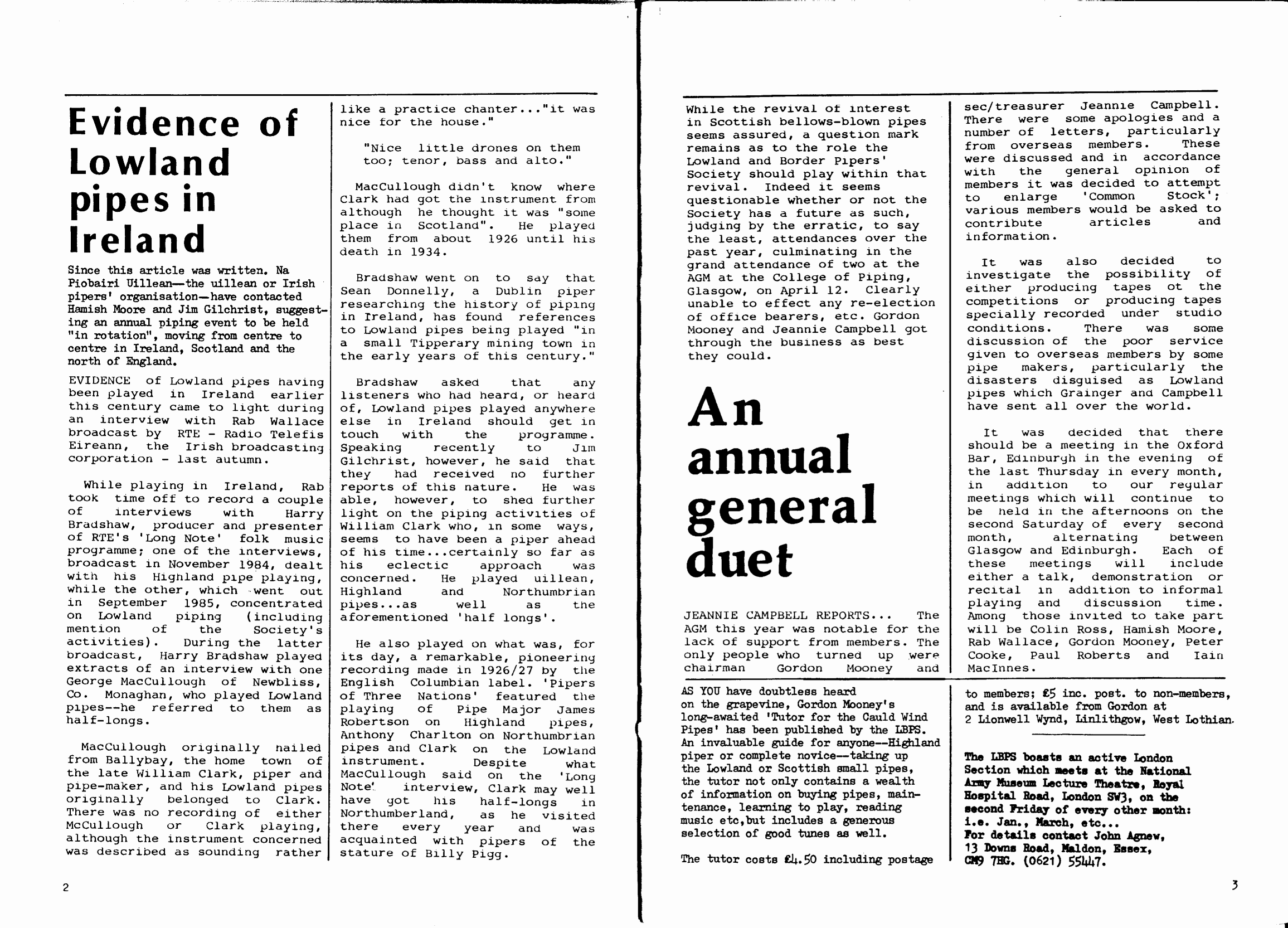Evidence of Lowland Pipes In Ireland

Since this article was written, Na Piobairi Ulllean—the uillean or Irish pipers' organisation—have contacted Hamish Moore and Jim Gilchrist, suggesting an annual piping event to be held "in rotation", moving from centre to centre in Ireland, Scotland and the north of England.
EVIDENCE of Lowland pipes having been played in Ireland earlier this century came to light during an interview with Rab Wallace broadcast by RTE - Radio Telefis Elreann, the Irish broadcasting corporation - last autumn.
While playing in Ireland, Rab took time off to record a couple of interviews with Harry Bradshaw, producer and presenter of RTE's ‘Long Note’ folk music programme; one of the interviews, broadcast in November 1984, dealt with his Highland pipe playing, while the other, which -went out in September 1985, concentrated on Lowland piping (including mention of the Society's activities). During the latter broadcast, Harry Bradshaw played extracts of an interview with one George MacCullough of Newbliss, Co. Monaghan, who played Lowland Pipes--he referred to them as half-longs.
MacCullough originally nailed from Ballybay, the home town of the late William Clark, piper and pipe-maker, and his Lowland pipes originally belonged to Clark. There was no recording of either McCullough or Clark playing, although the instrument concerned was described as sounding rather like a practice chanter.
... ..."it was nice for the house. Nice little drones on them too; tenor, bass and alto”
MacCullough didn't know where Clark had got the instrument from although he thought it was "some place in Scotland". He played them from about 1926 until his death in 1934. Bradshaw went on to say that Sean Donnelly, a Dublin piper researching the history of piping in Ireland, has found references to Lowland pipes being played "in a small Tipperary mining town in the early years of this century.”
Bradshaw asked that any listeners who had heard, or heard of, Lowland pipes played anywhere else in Ireland should get in touch with the programme. Speaking recently to Jim Gilchrist, however, he said that they had received no further reports of this nature. He was able, however, to shed further light on the piping activities of William Clark who, in some ways, seems to have been a piper ahead of his time, certainly so far as his eclectic approach was concerned. He played uillean, Highland and Northumbrian pipes...as well as the aforementioned ‘half longs’.
He also played on what was, for its day, a remarkable, pioneering recording made in 1926/27 by the English Columbian label. ‘Pipers of Three Nations' featured the playing of Pipe Major James Robertson on Highland pipes, Anthony Chariton on Northumbrian pipes and Clark on the Lowland instrument. Despite what MacCullough said on the ‘Long Note’ interview, Clark may well have got his half-longs in Northumberland, as he visited there every year and was acquainted with pipers the stature of Billy Pigg.
While the revival of interest in Scottish bellows-blown pipes seems assured, a question mark remains as to the role the Lowland and Border Pipers' Society should play within that revival. Indeed it seems questionable whether or not the Society has a future as such, judging by the erratic, to say the least, attendances over the past year, culminating in the grand attendance of two at the AGM at the College of Piping, Glasgow, on April 12. Clearly unable to effect any re-election of office bearers, etc. Gordon Mooney and Jeannie Campbell got through the business as best they could.
